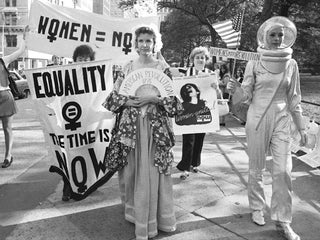Summary
Due to business closures and a significant drop in travel stemming from the COVID-19 pandemic, an unprecedented number of workers are facing unpaid time off or unexpected layoffs. Women are by no means the only ones shouldering the financial fallout, but they may face challenges that can make this situation…
The content on this page is accurate as of the posting date; however, some of our partner offers may have expired. Please review our list of best credit cards, or use our CardMatch™ tool to find cards matched to your needs.
Due to business closures and a significant drop in travel stemming from the COVID-19 pandemic, an unprecedented number of workers are facing unpaid time off or unexpected layoffs. Women are by no means the only ones shouldering the financial fallout, but they may face challenges that can make this situation much more acute.
Women have on average less of a financial cushion than men. According to the Transamerica Center for Retirement Studies, women have a median of $23,000 saved for retirement, while men report $76,000. Though it’s generally not a good idea to use money saved for the future for short-term needs, circumstances of extended unemployment could make that a necessity. Women who find themselves in that situation will likely have a much smaller safety net than men.
See related: How women can save for retirement
They also might not have had the same opportunity to build a safety net, thanks to the gender pay gap.
“There’s going to be a lot more people relying on credit and leaning on credit cards,” says Lynnette Khalfani-Cox, CEO of TheMoneyCoach.net, founder of AskTheMoneyCoach.com and author of “Zero Debt: The Ultimate Guide to Financial Freedom.”
Many women depend on service industry jobs
As service jobs dry up, so does a major source of income for women.
“Many of the companies most likely to go out of business – so many of those jobs are dominated by women,” says Gianola.
Service jobs are being hit hard in the effort to contain the virus. And these jobs mean income for more than four out of 10 women – compared to a little more than two out of 10 men, according to a report by the Institute for Women’s Policy Research.
Many of those making an hourly wage also don’t normally get paid sick days. In March 2019, 43% of part-time workers didn’t get paid sick leave, according to the Bureau of Labor Statistics. And 27% of all workers didn’t get paid sick days.
The Families First Coronavirus Response Act mandates that certain employers need to provide 2 weeks paid sick leave to employees who are diagnosed with COVID-19 or caring for certain family members who are. But it does not include businesses with more than 500 employees.
“In the sense that businesses are forced to shut down, I think that women’s earning will take a hit,” says Khalfani-Cox. “Which means their savings will drop as well … It’s hard to position yourself for the long term and think long term.”
These businesses closing is also upending a lot of the normal go-to jobs people turn to for extra income.
In a two-income family, service jobs often helped during layoffs, says Ginita Wall, CPA, CFP and author of “The Way to Save: A 10-Step Blueprint for Lifetime Security.” But with so many businesses closing and cutting back, “that’s probably not going to be as possible.”
“I don’t want to minimize the burden on men,” says Jill Gianola, financial planner and author of “The Young Couple’s Guide to Growing Rich Together.” “It’s like the first wave hits women harder. They’re more vulnerable, they’re more likely to be responsible for family.”
Women are still primary caregivers
“From a childcare point-of-view, women are still the primary caregivers,” says Jean Chatzky, CEO and co-founder of HerMoney.com and the HerMoney podcast. So as schools and daycare centers close, it’s working moms who are scrambling to make arrangements for childcare.
Women are also the “vast majority of caregivers” for older family members, says Chatzky. “And that’s a problem when we’re not in crisis mode.”
For those who are still going to work or working from home, that presents a conundrum. “A lot of women are saying ‘I have to work – how am I going to do this?’” says Wall. Women “are more likely to have a job where, if they don’t go to work, they don’t earn. They’re stuck.”
See related: Balancing financial priorities: Why it’s OK to put yourself first
Financial hardship during recession
When there are layoffs and cutbacks, some women wonder if their male counterparts will get favorable treatment. In the past, women were too often the first to lose their jobs during layoffs, says Wall.
“The main thing I’m seeing is that so many women are contemplating what coronavirus might mean for their finances in a direct way,” says Khalfani-Cox. But there are also indirect costs, too, she says. They include looking after children stuck at home or paying out-of-pocket to provide necessary medicines for sick family members.
“We’ll definitely see debt levels increase,” she says.
Then there’s the long-term financial toll. If women are the ones out of work – or the ones forgoing work to look after children who are out of school – they’ll also face an unplanned reduction to Social Security credit and retirement contributions, says Chatzky. While that might not be a concern in the middle of a crisis, it does have a long-term impact on women’s financial health.
Many are predicting that vulnerable groups – including women, the elderly and those living paycheck to paycheck – will need some outside help to get through the crisis.
“I think the longer this goes on, the more we are going to see people fall back on the social safety net,” Chatzky says. “Half the country is already living paycheck to paycheck. It takes an already fragile society and pushes it closer to the edge.”
The federal government has announced emergency relief measures to help citizens recover from the pandemic’s economic crisis, including direct payments. But for those experiencing prolonged unemployment, this plan might fall short.
“Our safety net in this country is pretty weak,” says Gianola. “Even more so for women. And it hits women harder.”
Physical effects beyond the virus
The physical impacts of stay-at-home orders go beyond potentially contracting coronavirus.
Restricted access to healthcare
In an effort to keep medical resources available for serious cases of coronavirus, many states have started restricting access to elective procedures and routine in-person appointments. Lawmakers in several states are seeking to include restricted access to abortions as part of this measure.
While this issue continues to be debated in state courts across the country, many women seeking abortions are caught in a period of uncertainty, unsure if they will be able to easily access this procedure before their pregnancy reaches the point at which abortion becomes illegal in their state.
This, coupled with economic uncertainty and other health concerns, could cause an increase in the number of women seeking unsafe abortions.
Legal abortions carried out by a trained medical provider are considered to be very safe. But complications from unsafe abortions account for an estimated 13% of maternal deaths worldwide, according to the World Health Organization.
Dangers at home
Periods of widespread economic uncertainty or hardship are also often accompanied by increases in domestic violence.
“The last time we saw something like this was [the economic meltdown of] 2008,” says Wall. “Things were bad for a good, long time. People were underwater and couldn’t make loan payments. You saw people staying together who should be splitting up – and a lot more violence in the household.”
In fact, a 2009 study by the National Domestic Violence Hotline found that 54% of those calling for help revealed that household finances had suffered in the past year. And 64% reported that the violence increased during that same time period.
Even before the current crisis, getting out of the house was a lifeline for some women and children. “It’s not safe for everybody to self-isolate,” says Khalfani-Cox. “It’s precarious for some.”
What you can do
The worst thing about a major crisis is it tends to leave us all feeling powerless. But there are some small steps you can take to help yourself and others:
More than ever, it pays to budget. “We look at the money coming in and the money going out,” says Chatzky. “And we know that the money going out is easier to control.”
“Times like this – just like times right after a layoff – call for careful monitoring,” she says.
Don’t go silent on creditors. “If you’re behind on a bill, call the creditor,” Chatzky says.
Gianola agrees. “Don’t just take unilateral action,” she urges. “Get in touch with them and let them know.”
If you know you won’t be able to pay your bill in time, consider consolidating your debt’s using a balance transfer credit card.
Best case: Even though you’ll have to make it up later, “at least you won’t be accruing interest and penalties,” says Gianola.
Take care of your physical and mental health. Whether it’s phoning friends, FaceTiming, or “virtual happy hour,” give yourself social outlets, Chatzky says. “We’re going to have to find ways to connect.”
“Getting some exercise is [also] really important,” she says. So while gyms may be shuttered, there are plenty of apps and free online exercise videos to sample. Or, if you’re in a place where you can, just put on your shoes and go out for a walk, she says.
If you have the means, give back. Local food banks and food pantries are gearing up for increased need. And they’re relying on getting help, too, says Zuani Villarreal, director of communication for Feeding America.
You can pitch in without being physically present by donating online, participating in a virtual food drive, raising awareness by sharing food bank messaging on social media and advocating for support at the federal level, she says.
To support nationwide efforts, give to the Feeding America COVID-19 Response Fund. If you want to support specific communities directly, you can use the organization’s food bank locator.
Editorial Disclaimer
The editorial content on this page is based solely on the objective assessment of our writers and is not driven by advertising dollars. It has not been provided or commissioned by the credit card issuers. However, we may receive compensation when you click on links to products from our partners.


